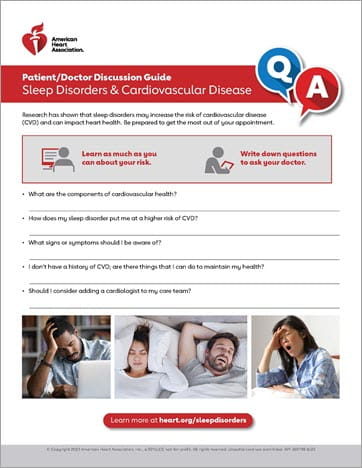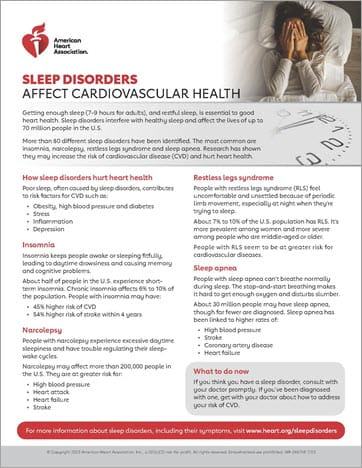Sleep Apnea and Heart Health

What is sleep apnea?
Sleep apnea is a condition that affects your breathing during sleep. It causes your breathing to stop and restart and can make it hard for your body to get enough oxygen. The episodes of disrupted breathing generally last at least 10 seconds and occur frequently throughout the night.
There are two main types of sleep apnea. Obstructed sleep apnea is when the soft tissue in your throat relaxes and makes it difficult to breathe. Central sleep apnea is when your brain has trouble regulating your breathing.
What are the symptoms of sleep apnea?
The symptoms of sleep apnea include:
- Irregular breathing during sleep.
- Loud snoring or gasping.
- Excessive daytime sleepiness.
- Morning headaches.
- Problems with concentration and memory.
- Mood or behavior changes, including irritability.
- Anxiety, depression.
How is sleep apnea diagnosed and treated?
Talk to your doctor if you think you have sleep apnea. You may think you have sleep apnea because a sleep partner lets you know they hear loud snoring or gasping during the night. Sleep apnea is often diagnosed through a sleep study. It can be treated through the use of a continuous positive air pressure (CPAP) machine, which helps regulate your breathing, as well as lifestyle changes. There are also surgical treatment options to open the airway.
View the Patient/Doctor Discussion Guide (PDF)
How many people are affected by sleep apnea?
Some estimates suggest that as many as one billion adults worldwide have sleep apnea. Sleep apnea is more common for men and overweight people.
How is sleep apnea linked to cardiovascular disease and brain health?
Sleep apnea increases the risk of CVD and can lead to worse outcomes from cardiovascular disease. Obstructive sleep apnea, in particular, has been linked to higher rates of high blood pressure, stroke, and coronary artery disease. There’s also evidence that sleep apnea can cause left ventricular diastolic dysfunction, which increases the risk of heart failure.
View How Sleep Disorders Affect Cardiovascular Health Fact Sheet (PDF)







